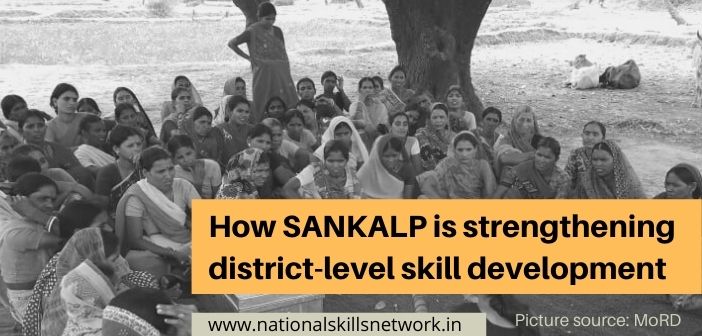
Skill Acquisition and Knowledge Awareness for Livelihood Promotion (“SANKALP”) is a programme and an initiative from the Ministry of Skill Development and Entrepreneurship (MSDE). It aims to improve short-term skill training, decentralize the skill development to the grassroots level, strengthen district-level skill development through District Skill Committees and bring in market connectivity and inclusivity of the marginalized section of the society.
To understand how SANKALP is strengthening district-level skill development and creating an impact at the ground level, we caught up with Ms. T Jayasudha, COO, SANKALP Cell, NIMI, MSDE. Learn more about this from the excerpts from our conversation below or you can also watch the video interview on YouTube, for which the link is given below.
Q: Could you tell us in brief about your experience working with SANKALP?
A: It is a dream come true for me to see the progress with SANKALP. Back in time, I was looking at an outcome-based skilling approach across the spectrum of education and not something limited to skilling alone. Working with SANKALP at the national level is quite a challenge and also an opportunity one rarely comes across.
Q: How is SANKALP getting implemented at the grassroots level?
A: SANKALP has different stakeholders who participate in the entire process. It is for the first time that the government has launched a programme that is decentralized at the grassroots level. Usually, there is one scheme that gets implemented everywhere, in a one-size-fits-all approach. But this is completely different because it takes into account, what a particular district’s ecosystem has to offer.
So, this is a very indigenous kind of approach. Additionally, this is also a project which brings into reality whatever was envisioned in the National Skill Development Mission in 2015. They had a few parameters like building infrastructure, quality enhancement, inclusivity of women, bringing industry partners, enabling livelihoods to marginalized and women groups through skilling, and also standardization with the implementation of NSQF aligned Qualification Packs (QPs) and National Occupational Standards (NOS). Through this, the Ministry has taken a very big leap.
MSDE is the nodal agency, whereas there are many other stakeholders in the complete process of its implementation. There are certain things that can only be implemented by the states and some things only at the district level. Also, NSDC is helping us with RPL at the Panchayati Raj level, where we are working with two districts in Uttar Pradesh, along with the support from UP Skill Development Mission. NIMI is implementing MGNF, where IIMB is the academic partner.
Q: Can you illustrate how the district-level decentralization happens with reference to PMKVY and MGNF?
A: SANKALP is also taking up PMKVY programs in the districts. There have been District Skill Committees (DSCs) established in almost all the districts in the country, but they were not functional. SANKALP has decided to activate them and create them in case they are not yet established. That is precisely what MGNF envisages doing.
MGNF , in partnership with IIM-B, is a unique program designed combining academic and district immersion. It is a first of its kind program. A certificate in Public Policy and Management is provided to the fellows at the end of two years. It has 40 days of academic modules and the rest of it is district immersion for about 4 months. They work with Collectors, district administration, District Skill Committees, and help them in district skill development planning.
To cite an example, a district skill development plan competition was conducted by MSDE in 2018-19. Out of 741 districts in India, 225 districts participated, 25 of those were shortlisted, seven of them were awarded and six of them received certificates. This year there is an increase in the number of district skill development proposals that have come up, which crossed the 400 mark.
MGN Fellows are competent individuals. The program creates a special cadre of individuals who will study what skills are possible at the grassroots level. DSCs get enough support from MGN Fellows who help them in district skill development planning and the SANKALP team in the ministry has also developed a tool kit to be disseminated amongst the districts.
These DSCs were not functional earlier or non-existent in some places. MGNF gave an opportunity to the district administration to rope in people from different walks of life, and also work with different line departments, different skill development programs of the state or the centre.
Also read: How SANKALP is being implemented to ensure efficiency and governance in skill development at the district level in India
https://nationalskillsnetwork.in/how-sankalp-is-being-implemented-to-ensure-efficiency-and-governance-in-skill-development-at-the-district-level-in-india/

Q: How does this help in implementing flagship schemes like PMKVY?
A: SANKALP deals with decentralized outlook. Only those activities which are feasible in that district are taken up. It is a neighborhood and environment policy where the ecosystem gives what is demand-driven. That is why they cannot apply PMKVY training across all the 741 districts in the country. They can identify those of which can create employment and entrepreneurial opportunity. For this, the fellows will be facilitators aiding the district administration.
Q: Do you think DSCs will have a role to play in other skilling programmes as well other than PMKVY?
A: Definitely. Other than PMKVY, there could be various other opportunities that can be identified not just for skilling but also for other entrepreneurial ventures. DSCs will have a role to play in all of these.
Q: How can we promote entrepreneurship at the rural level and connect skills with entrepreneurship?
A: First we must create awareness among the people who are outside the skilling system. If you look at the entire skilling landscape in this country, you can see that most of them are only from the unorganized sector. We must bring them on board and make them aware of various opportunities for them, not just entrepreneurial or employment, but also to upskill, reskill and also get their skills recognized under RPL.
For example, if you look at livelihood promotion, awareness could be created for getting good wages for the kind of work, they do. This is not something marginalized or the women are aware of. That way this is a very good initiative.
Read more from SANKALP – https://nationalskillsnetwork.in/sankalp/
Q: What is the road-map you have for SANKALP in the coming months?
A: I would like to reiterate here, the role that NCVET is going to play in the skilling ecosystem, as from now on it is going to be a new regulator. With the creation of NCVET, there is a synergy of both the short-term and long-term skilling, any training provider offering any training program henceforth, would have to depend on QPs and NOS, with the possibility of NOS could be plugged and played, to match the requirement of a particular training group. Secondly, for those of the unorganized sector, we can get their RPL done as we have done it in two districts of Uttar Pradesh so that they get certificated to get wages appropriate to their skills. By doing all this, SANKALP is bringing into reality whatever the NSDM has envisaged in 2015.





